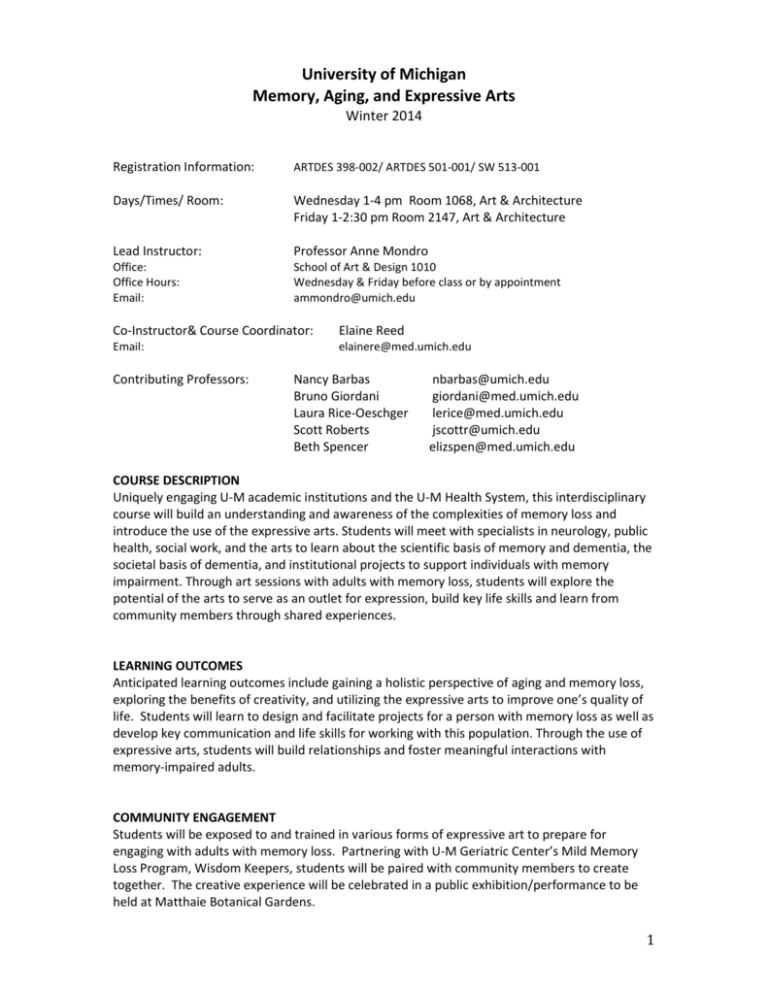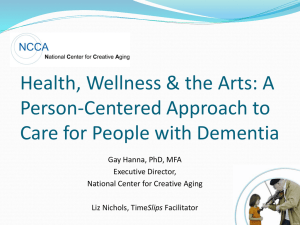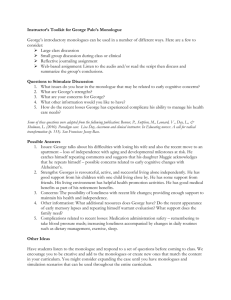Memory, Aging, and Expressive Arts (Winter 2014)
advertisement

University of Michigan Memory, Aging, and Expressive Arts Winter 2014 Registration Information: ARTDES 398-002/ ARTDES 501-001/ SW 513-001 Days/Times/ Room: Wednesday 1-4 pm Room 1068, Art & Architecture Friday 1-2:30 pm Room 2147, Art & Architecture Lead Instructor: Professor Anne Mondro Office: Office Hours: Email: School of Art & Design 1010 Wednesday & Friday before class or by appointment ammondro@umich.edu Co-Instructor& Course Coordinator: Elaine Reed Email: elainere@med.umich.edu Contributing Professors: Nancy Barbas Bruno Giordani Laura Rice-Oeschger Scott Roberts Beth Spencer nbarbas@umich.edu giordani@med.umich.edu lerice@med.umich.edu jscottr@umich.edu elizspen@med.umich.edu COURSE DESCRIPTION Uniquely engaging U-M academic institutions and the U-M Health System, this interdisciplinary course will build an understanding and awareness of the complexities of memory loss and introduce the use of the expressive arts. Students will meet with specialists in neurology, public health, social work, and the arts to learn about the scientific basis of memory and dementia, the societal basis of dementia, and institutional projects to support individuals with memory impairment. Through art sessions with adults with memory loss, students will explore the potential of the arts to serve as an outlet for expression, build key life skills and learn from community members through shared experiences. LEARNING OUTCOMES Anticipated learning outcomes include gaining a holistic perspective of aging and memory loss, exploring the benefits of creativity, and utilizing the expressive arts to improve one’s quality of life. Students will learn to design and facilitate projects for a person with memory loss as well as develop key communication and life skills for working with this population. Through the use of expressive arts, students will build relationships and foster meaningful interactions with memory-impaired adults. COMMUNITY ENGAGEMENT Students will be exposed to and trained in various forms of expressive art to prepare for engaging with adults with memory loss. Partnering with U-M Geriatric Center’s Mild Memory Loss Program, Wisdom Keepers, students will be paired with community members to create together. The creative experience will be celebrated in a public exhibition/performance to be held at Matthaie Botanical Gardens. 1 COURSEWORK Undergraduate coursework requirements include: Written responses to the following topics o Professor Mondro: Benefits of Creativity & Experiential Aging Exercise o Professor Rice-Oeschger: Personhood o Professor Spencer: Psychological & Social Aging o Professor Barbas: Neurology of Memory o Professor Giordani: Neuropsychology behind Dementia & Creativity o Professor Barbas & Professor Spencer: Narrative Medicine o Professor Roberts: Public Health & Dementia o Elaine Sims, Director of U-M Hospital Gifts of Art Program: Art & Healthcare Journal entries Blog entry Collaborative project proposal for Wisdom Keeper member Midterm response paper Book response Final reflection piece Graduate coursework requirements include: Written responses to the following topics o Professor Mondro: Benefits of Creativity & Experiential Aging Exercise o Professor Rice-Oeschger: Personhood o Professor Spencer: Psychological & Social Aging o Professor Barbas: Neurology of Memory o Professor Giordani: Neuropsychology behind Dementia & Creativity o Professor Barbas & Professor Spencer: Narrative Medicine o Professor Roberts: Public Health & Dementia o Elaine Sims, Director of U-M Hospital Gifts of Art Program: Art & Healthcare Journal entries Blog entries Collaborative project proposal for Wisdom Keeper member Midterm response paper Book responses Dementia care specialist interview & presentation Final reflection piece GRADES Grading for this class will be based on class participation, attendance, and assignments. Since this class involves working directly with the community, students are expected to be well organized and properly prepared for working with their community member. A grade of “A” is given to assignments that are thoughtfully designed, ambitious, well structured, imaginative and extensively researched. A grade of “B” is given to assignments that excel in idea, ambition, imagination and/or research, but falls short in the other areas. The grade of “C” means that the project is average. The grade of “D” is given to completed projects that show minimal investment of time, thought, and energy. An “F” is given to incomplete projects that show minimal effort. 2 CLASS PARTICIPATION AND ATTENDANCE Students are expected to attend all classes. The exception is a severe illness or emergency or official U-M obligation. If you have a severe illness or emergency, please notify Professor Mondro and Elaine Reed at least three hours before class via email. This is especially important on days we visit Wisdom Keepers. If you have an official U-M obligation, it is expected you notify the instructor as soon as possible of your absence. Wisdom Keeper workshops require the class to meet at 1:00 pm sharp. If you miss the bus, it is your responsibility to call Professor Mondro and make alternative plans to arrive as soon as possible to the site. CTOOL SITE & COURSE BLOG The course will utilize a ctool site to post announcements, reading material, video clips, and other pertinent course information. Students are expected to check the site regularly for updates. A blog has been created for this course. Students are expected to be active members and add thoughtful comments throughout the semester. Specific requirements for participation will be provided. COURSE TEXTBOOKS The course requires the following textbook(s): Undergrad & graduate students: Ten Thousand Joys & Ten Thousand Sorrows: A Couple's Journey Through Alzheimer's by Olivia Ames Hoblitzelle Undergrad & graduate students: The Shapes of Memory Loss: Stories, Poems, and Essays from the University of Michigan Medical School and Health System by Nan Barbas, Laura RiceOeschger, and Cassie Starback with Contributions by Patients, Family Members, and Health Professionals* Graduate students: Forget Memory: Creating Better Lives for People with Dementia by Anne Davis Basting Students may purchase either the paperback or digital version of Ten Thousand Joys & Ten Thousand Sorrows and Forget Memory. Paperbacks are available at Literati Bookstore (124 East Washington Street, Ann Arbor, MI 48104). All students will receive a free copy of The Shapes of Memory Loss. Additional reading material will be photocopied for the students and/or placed on the ctool site. COURSE MATERIALS AND SUPPLIES Three ring binder Three ring hole punch Notebook Pen/pencil Scissors Sharpie Marker – fine tip Digital camera * *For students that want to explore photography or video with their community member and/or for their final reflection piece. All students are eligible to check out equipment to use for this course at the Duderstadt Checkout. The checkout is on the second floor 3 circulation desk of the Duderstadt Center. Students can check out a video camera kit, still camera kit, tripod, and light kit. TENTATIVE COURSE SCHEDULE o This schedule lists the key deadlines for papers and projects. o Readings listed are to be read prior to class o Blog entries are not on this schedule. Instructions and deadlines for those will be discussed in class. 1-8-14 Course overview Benefits of creativity Art exercise 1-10-14 Experiential aging exercise Storytelling exercise Readings: Creativity and Communication in Persons with Dementia, Chp. 8 Telling Stories The Creative Age: The Flames of Creativity 1-15-14 Podcasts & Personhood in Cognitive Loss & Care Partnering: Prof. Laura Rice Oeschger Readings: Making Friends With Your Illness Perspectives: A Newsletter for Individuals with Alzheimer’s or a Related Disorder Finding Hope in the Midst of Despair Personhood in Dementia Care StoryCorps’ Memory Loss Initiative Six Life Lessons Dementia Can Teach Us The Creative Arts in Dementia Care: Time and space now, and embodied contact The Alzheimer’s Journey: Living Mindfully with Memory Loss: Wisdom Shared by Individuals Living with Memory Loss 1-17-14 Psychological & Social Aging: Prof. Beth Spencer Readings: Psychosocial Adjustments to Aging Another Country: Chapter 1 1-22-14 Meet at University of Michigan Museum of Art for class Guest Lecturer: Prof. Ruth Slavin Expressive art experiences Readings: Playfulness & Dementia: To Play or Not to Play? Playfulness & Dementia: Even a Few Scribbles Meet me at Moma 4 1-24-14 Neurology of Memory Part 1: Professor Nan Barbas Readings: Proust Was a Neuroscientist Coda Selective Review of Cognitive Aging 1-29-14 Matthaie Botanical Gardens visit – meet in classroom Cultivating Presence : Listening & Spontaneity Listening Lecturer: Prof. Laura Rice Oeschger Music Experience: Guest Lecture: Lori Fithian Readings: Taking Care of the Caregiver How to Best Help Alzheimer’s Caregivers? Teach Them Mindfulness The Balance Study: Using Meditation to Help Caregivers Take Care of Themselves Mind-Body Research List Mindful Wellness Resources (including Care Partnering Books) Meditation May Slow Progression of Alzheimer’s Video: Listening is an Act of Love http://www.youtube.com/watch?v=Jfnf708ukZI Mind wise (podcasts) http://alzheimers.med.umich.edu 1-31-14 Neurology of Memory Part 2: Prof. Nan Barbas Reading: Normal and Pathological Cognitive Aging in Late Adulthood 2-5-14 Music & art exercises Ipad creative art exercises Expressive art training 2-7-14 Story sharing exercises 2-12-14 Guest: Doug Dault, Director of U-M Geriatic Center’s Silver Club Programs Review and prep project for first visit with Wisdom Keepers 2-14-14 Neuropsychology behind Dementia & Creativity Readings: Portraits from the Mind William Utermohlen The Healthy Brain Initiative Preserving Connections Through Creativity: The Neuropsychology Behind Dementia & Creativity 5 2-19-14 Wisdom Keepers: Visual Art 2-21-14 Narrative Medicine: Prof. Beth Spencer and Prof. Nan Barbas Reading Creative Approaches in Dementia Care 2-26-14 Midterm response papers due Wisdom Keepers: Drumming with Lori Fithian 2-28-14 Caregiving Communication: Prof. Beth Spencer Readings: Should Families Provide For Their Own? Measure of Heart: A Father’s Alzheimer’s; A Daughter’s Return Learning to live in the world of dementia. In Your Name is Hughes Hannibal Shanks 3-5-14 No class – Winter Break 3-7-14 No class – Winter Break 3-12-14 Wisdom Keepers: Story & writing 3-14-14 Project proposals ideas due Discuss ideas 3-19-14 Wisdom Keepers: student/member collaboration 3-21-14 Review collaborative experience Grad students present their insights from professionals in the field 3-26-14 Book response due for Ten thousand Joys & Ten thousand Sorrows Wisdom Keepers: student/member collaboration 3-28-14 Public Health & Dementia: Prof. Scott Roberts Readings: Older Drivers 6 Healthy Brain Initiative Roberts & Tersengno 4-2-14 Wisdom Keepers: student/member collaboration 4-4-14 Guest: Elaine Sims, Director of U-M Hospital’s Gifts of Art Program 4-9-14 Graduate second book response due Wisdom Keepers: student/member collaboration 4-11-14 Student reflection pieces due Organize exhibition/performance at Matthaie Botanical Gardens 4-16-14 Exhibiont/Performance at Matthaie Botanical Gardens – meet at Art & Design 4-18-14 Share reflection pieces Course evaluation 7







